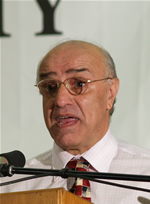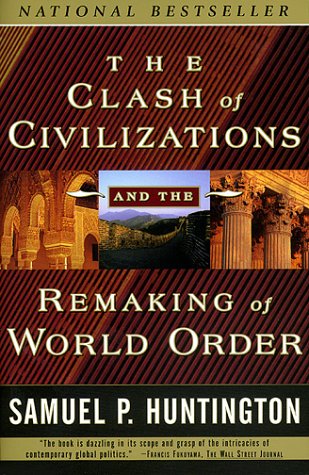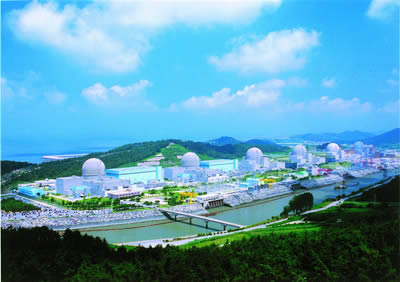Schiller Institute Conference September 15-16, 2007 Kiedrich, Germany The U.S. Neo-Cons and Iran's Nuclear Energy Pirouz Mojtahed-Zadeh, PhD |
 EIRNS/Julien Lemaître |
Dr. Mojtahed-Zadeh is a professor of political geography and geopolitics at Tarbiat Modarres University in Tehran. He is also chairman of the Urosevic Research Foundation in London. The full title of his speech to the Schiller Institute conference on Sept. 16 was "The Iranian Nuclear Energy Program: An Excuse for U.S. Neo-Cons To Wage War on the People of Iran."
Thank you very much, Madam Chairman, for the introduction, and yesterday afternoon when listening to your somewhat light-hearted discussion with the Russian professor, I could not help thinking how right you were in assessing the program of the Eurasian Land-Bridge as not being limited to an economic development program for Eurasia alone, but a cornerstone of a global reconstruction program that could offer mankind an alternative to the present socio-economic system of the U.S. Neo-conservatives' New World Order, described by Lyndon LaRouche as the Anglo-American empire which is corrupt and on the verge of collapse.
Hence, one cannot think of LaRouche's alternative world order simply in terms of national benefits for the countries of Eurasia, and lose sight of the fact that it can offer an alternative to the existing global system, the ultimate success of which is achieved as a result of the failure of the current system, which is wholly based on wars and devastation. A "War of the Worlds" seems to be what the existing system is bent on bringing about, and after what we have seen in Afghanistan, Iraq, and Lebanon, a major war on Iran seems to have become imminent, with the kind of devastation that you wisely warned this conference about in your introduction: devastation of global proportions.
This is absolutely correct, as thus far the neo-cons have waged wars of devastation on Afghanistan, Iraq, and Lebanon, all of which happen to be Muslim nations. But this time they are planning to wage war on an "Islamic Republic," which, if it happens, will set the Christian West against Muslim East, and make Samuel Huntington's "Clash of Civilizations" a reality. To reach this monstrous goal, the unholy alliance between Israelis, U.S. neo-cons, and their new-found friends in France, is making effective use of monopolizing news media, and has turned the so-called international media into a very effective tool in their propaganda war, thus subjecting international public opinion to a well-orchestrated campaign of disinformation and misinformation. In other words, they demonize Muslim nations in international public opinion, and then unleash their war machine on them, committing the most horrific crimes against humanity, as has been the case in all the three countries mentioned hitherto.


Madam Chairman, George Bush and Dick Cheney seem to have found themselves on the point of "make or break," and in order to save themselves from their present position as the undisputed losers of Iraqi, Afghani, and Lebanese wars, they have decided to pursue their ultimate aim of a War of the Worlds between the Christian West and the Muslim East, by starting the war on Iran, without bothering to find an excuse for it. They seem increasingly unconcerned with the issue of prior justification for war, and want to leave finding justifications for later. Nevertheless, since the strategy of turning the issue of Iran's nuclear energy program into a pretext for starting a war and/or imposing crushing economic sanctions against Iran is still going on, they have decided to allow those efforts to continue, although their result is to clear Iran of all false accusations laid upon her by the United States and Israel. [International Atomic Energy Agency Director General Mohamed] ElBaradei's expression of impatience with the U.S. lies and the media campaign has started to sound so similar to Hans Blix's expression of impatience with the American lies leading to the war on Iraq.
While in his report of Sept. 10, 2007 to the board of governors of the IAEA, the Director General of that UN body described the agreements between his Agency and Iran as an "important step in the right direction,"[1] the U.S. government described the same development as "an attempt by the Iranian government to distract from its intention of developing nuclear weapons."[2] This attempt to sabotage progress in the settlement of the issue of Iran's nuclear energy program leaves no doubt once again that not only is the United States aware of the fact that there is no strategic threat from Iran's nuclear energy program, but also there is no willingness in the White House to settle the crisis that has been created over it.
The reason for this is quite obvious to me. The United States has reiterated its intention to effect "regime change" in Iran, by making an excuse of whatever issue that could justify waging wars or imposing crippling sanctions on the people of Iran. The first excuse was that Iran was exporting its revolution to the neighboring states. Saddam Hussein was armed and encouraged to wage a war of devastation on the people of Iran, with more than 1 million dead and well over a $1,000 billion of devastation, with no result for anyone except that it united the people of Iran with the regime that America wanted to change, which in turn, guaranteed the I.R.I.'s [Islamic Republic of Iran's] survival at its shaky start. Then there were other allegations to be exploited, as excuses for starting the promised war on the people of Iran. However, although President Bush and Dick Cheney have moved to their next excuse, in the shape of the implausible allegations that the I.R.I. supports al-Qaeda and Taliban terrorists in Iraq and Afghanistan, respectively, to the detriment of its own peace and security, efforts to use the issue of Iran's nuclear energy program as an excuse to start the war are still in full swing.
The U.S.-Israeli Dimension
Sadly, with their unfounded fear of an Iranian bomb, the United States and Israel have made the best use of their monopoly control of major news media to prevent the world from seeing Iran's legitimate quest for nuclear energy to provide for its critical energy needs. It is, however, the recognition of this national need which is essential for holding a meaningful dialogue with Tehran, or to deter it from the possibility of expanding its nuclear technology to bomb-making. To this end, they ignore these facts:
1. It was Washington that encouraged Iran in the 1970s to go for nuclear energy, to confront its fast-developing needs for energy in the 1980s and beyond. Washington signed an agreement with Iran in July 1978, which stipulated, among other things, U.S. export of nuclear technology to Iran, and material and expertise in searching for uranium deposits.
2. With an annual growth of 6-8% in demand for electricity, and a population estimated to reach 100 million before 2025, Iran cannot rely exclusively on oil and gas for its energy needs. Iran's current production level of 3.5 million barrels per day is increasingly geared toward domestic consumption, which has grown by more than 280% since the 1979 Revolution. If this trend continues, Iran will become a net oil importer beyond 2010, a catastrophe for a country that relies on oil for 80% of its foreign currency and 45% of its annual budget.[3]
3. The importance of diminishing Iran's fears and replacing threats against Iran's territorial integrity by acknowledgment of her constructive conflict-management role in the region. This would achieve a lot more toward Iranian nonproliferation than war, or years—or even decades—of sanctions. This, in turn, requires a willingness by the United States to recognize Iran's important role in regional stability, as demonstrated by its cordial relations with the government of Hamid Karzai in Kabul, and its endorsement of the elected government in Baghdad, as well as negotiating with the U.S. on Iraqi security. These, of course, will simultaneously bring into the open the fact that the crisis over Iran's nuclear energy program is a crisis of choice, not necessity,[4] and threats are not the way to influence Iran.[5]
'Nation Change' Replaces 'Regime Change'
Neo-cons in Washington have made no secret of the fact that they prosecuted the issue of Iran's nuclear energy program to a large extent as an excuse to implement their well-publicized strategy of "regime change" against the Islamic Republic in Iran. In a similar strategy, the United States succeeded to change the Ba'ath regime in Iraq, by creating one of the most fearsome terrorist crises in the Middle East; but its failure so far to change the regime in Iran, seems to be the core reason for Washington and Tel Aviv to engage in clandestine subversive operations inside Iran, encouraging separatist movements among Pan-Turk, Pan-Kurd, Pan-Arab, and other terrorist organizations in [the] Azerbaijan, Kurdistan, Khuzestan, and Baluchistan [areas] of Iran. Former Israeli Deputy Prime Minister Shimon Peres brought this information into the open by publicly admitting that his country and the United States are involved in operations aimed at disintegration of Iran.[6] That is to say that they have broken international rules and regulations in order to make a legal case against Iran's nuclear energy program, continued at the UN Security Council level, in order to pave the way for legalizing economic sanctions or military actions against Iran[7]—while conspiracy to cause the disintegration of Iran needs no legalizing. This is living proof that the neo-con Administration in Washington is leaving no stone unturned, in proving to be the national enemy of the people of Iran, and any measure to implement their strategy of changing the Islamic regime boils down to causing devastation to the people of Iran, in much the same way as they have devastated Iraq and its people.[8]
Worse still is their expectation that we, the people of Iran, keep silent vis-à-vis these atrocities against our country and our people, and if some of us decide to defend our national dignity, our national rights, and our country's territorial integrity, the United States and Israel reduce themselves to using their agents inside and outside Iran, to wage a personal war, trying to discredit each one of us. Recently in a televised debate on an English-language Iranian television program, I was accused by a White House press staff official of "taking my line from the Iranian Foreign Ministry." I wondered if he knew that it has been more than four years since I have even taken part in any gathering where leaders of the I.R.I. Foreign Ministry happened to be present.
How To End the Crisis
In order to prove that Iran is pursuing a clandestine nuclear weapons program, the United States enforced an extensive investigation of suspected sites in Iran by the IAEA. In spite of the U.S. displeasure at the IAEA's impartial investigations and reports, and threats against its Director General, Dr. ElBaradei's, future in his job, reports of investigations throughout the years have cleared Iran of allegations of wrongdoing.
Moreover, it was on the basis of these inspections and reports carried out, according to the Tehran agreement between Iran and the EU-3 in 2003, that the IAEA Board of Governors passed resolutions in 2004, recognizing Iran's pledge of peaceful use of nuclear energy. Disappointed by these results from the IAEA investigations, some of the most influential Western media began a campaign of misinformation and disinformation. These propaganda campaigns seem to have deprived international public opinion of the awareness that, should Iran succumb to illegal demands of Washington and Tel Aviv in depriving herself of an independent national fuel supply, she would have left a dangerous precedent, allowing big powers to interfere in the peaceful internal affairs of smaller nations, and would have given up her own independence in respect of the use of nuclear energy, by becoming dependent on supplies of nuclear fuel from other countries. Though the U.S. and Israel, supported by the EU, managed to get the UNSC to issue punitive resolutions against Iran, they were confronted by the unanimous demand of the international community that the issue of Iran's nuclear energy program be settled through diplomacy and negotiations.
Though the IAEA investigations of the country proved that no evidence was found indicating an Iranian intention of using the nuclear industry for strategic purposes, the IAEA decided, on instructions from Washington and Tel Aviv, as well as the European Union, to refer Iran's dossier to the UN Security Council, by invoking Chapter VII of the UN Charter, against the clearly pronounced advice of the UN Secretary General, who stated that the Security Council was not the appropriate forum for debating Iran's case, and that it was the IAEA Board of Governors which was the authority to discuss the matter.
Chapter VII of the UN Charter specifies that a country can be referred to the UNSC under that chapter only if it has "threatened the peace," "broken the peace," and/or "undertaken acts of aggression." Not only did the IAEA not accuse Iran of any of those things, but the documents the IAEA included in the dossier in support of its referral, consistently confirm that no evidence had been found that would incriminate Iran of trying to use its nuclear industry for strategic purposes. Hence, by trying to put Iran's nuclear energy program on trial, in a process legally unjustifiable, the UN Security Council has indeed put on trial its own integrity and credibility.
This has made the international community emphatically demand a peaceful settlement of the Iranian nuclear energy crisis through diplomacy. But a negotiated settlement has proved to be impossible, because of the obstruction by U.S. President Bush, who has imposed his precondition that "any negotiation with Iran must be subject to Iran's suspension of the uranium enrichment process." By doing so, in reality, the United States has made sure that no negotiation would commence with Iran, as, if Iran were to be forced to bring to a complete halt its uranium enrichment activities, as a precondition for negotiations, what would be left there for Iran to negotiate about?
In the latest development, the IAEA chief's report on Sept. 11, 2007, to the Board of Governors of that UN body, that the agreement with Iran had been designed to remove all outstanding questions, met with a hostile reaction from the Portuguese Ambassador, acting on behalf of the European Union. This suggests that the departure of Tony Blair and Jacques Chirac from the political scene has not changed the EU's obedience to the U.S.-Israeli instruction to keep the Iranian nuclear energy program as a pretext for inflicting war and/or devastating sanctions against her. It is unfortunate that the EU defies all aspects of political and geopolitical wisdom and behaves in this manner. The EU might try to see the wisdom of the advice of the IAEA chief, that "sanctions have to be coupled at all times with incentives and a real search for a compromise based on face-saving, based on respect," and try to work out a new and independent policy to remove the current impasse, which is the result of imposing preconditions for negotiations.
Europe did a very bad job of its so-called "mediation," by trying to impose the U.S. precondition on Iran, instead of negotiating a way out of the stalemate which was created by that same precondition. The united Europe is indeed well placed to overcome the stalemate by adopting a more independent position as an honest broker, and trying to find an alternative regime that would be more in keeping with Iran's progress in producing enriched uranium, as has been indicated recently by Dr. ElBaradei, the chief IAEA inspector. Perhaps an effective international control of the level and degree of Iran's enrichment process can be worked out through actual U.S. or EU partnership with Iran in her uranium enrichment industry and production of nuclear fuel.[9]
All these are for the resolution of the issue of Iran's nuclear energy program in a normal process. But the time is not normal, and the more desperate the axis of Bush-Cheney-Olmert-Sarkozy gets, the more imminent the danger of war on Iran, with its global consequences, seems to become. It is in view of this imminent danger, Madam Chairman, that I would like to propose passing of a resolution by this magnificent gathering of peace-loving intellectuals from no less than 27 countries, to condemn without reservation any military action against Iran.[10][1] Ettelaat International, quoting IRNA News Agency, London, Sept. 12, 2007, p. 1.
[2] Abbas Edalat & Mehrnaz Shahabi, "Changing course on Iran," The Guardian, London, Sept. 10, 2007.
[3] For more on these, see Pirouz Mojtahed-Zadeh et al., "Iran needs nuclear power," International Herald Tribune, Oct. 14, 2003, www.iht.com/articles/2003/10/14/edsahimi_ed3_.php.
[4] Pirouz Mojtahed-Zadeh and Kaveh Afrasiabi, "Iran's nuclear program: A crisis of choice, not necessity," International Herald Tribune," Aug. 12, 2005.
[5] Pirouz Mojtahed-Zadeh and Kaveh Afrasiabi,"Threats are not the way to influence Tehran," International Herald Tribune, July 2, 2004.
[6] Shimon Peres in interview with Fox News, as reported by IRNA semi-official news agency, Dec. 03, 2006.
[7] Pirouz Mojtahed-Zadeh, "Letter to President George W. Bush," London, April 17, 2006, www.payvand.com/news/06/april/1165.html.
[8] Pirouz Mojtahed-Zadeh, "War on Iran will lead to World War III as U.S. Neo-Cons also admit," speech at a conference on "Iran and U.S. War Drive in Middle East," organized by CASMII at London University, Sept. 25, 2006.
[9] For more on this, see Pirouz Mojtahed-Zadeh, text of speech to EU Parliament, Brussels, July 4, 2007.
[10] Such a resolution was passed. See EIR, Sept. 28, 2007, p. 24.—ed.
Related Links:
More Speeches from the Schiller Institute Conference
A Nuclear-Powered Desalination Plant for Use in the Middle East
The Beauty of Completing the Nuclear Fuel Cycle
Maps of Great Infrastructure Projects
Kiedrich Resolution Against Iran War
Kiedrich Resolution for the Eurasian Landbridge
Summary of the Landbridge Conference Proceedings


